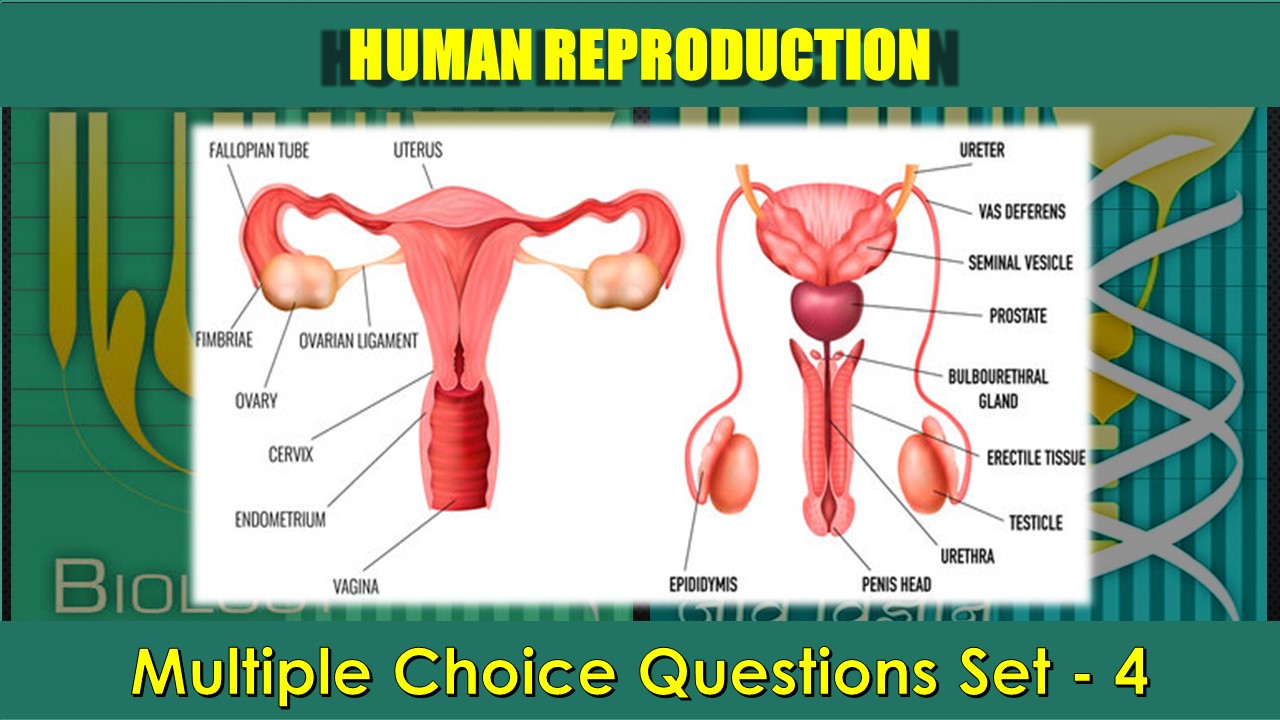CBSE Class 12 Human Reproduction Multiple Choice Questions with Answers. MCQ Questions Class 12 Human Reproduction with Answers Is Prepared Based on Latest Exam Pattern. Students can solve NCERT MCQ questions Class 12 Human Reproduction with Answers to know their preparation level.
Students who are searching for NCERT MCQ Questions Class 12 Human Reproduction with Answers are compiled here to get good practice on all fundamentals. Know your preparation level on MCQ Questions for Class 12 Human Reproduction with Answers. You can also verify your answers from the provided MCQ Class 12 Human Reproduction with Answers. So, ace up your preparation with MCQ of Class 12 Biology Examinations.
MCQ Questions Class 12 Human Reproduction with Answers - Set - 4
Question 1:
Changes in GnRH pulse frequency in females is controlled by circulating levels of
(a) progesterone only
(b) progesterone and inhibin
(c) estrogen and progesterone
(d) estrogen and inhibin
Correct Answer – (C)
Question 2:
Meroblastic cleavage refers to which type of division of egg
(a) Complete
(b) Spiral
(c) Incomplete
(d) Horizontal
Correct Answer – (C)
Question 3:
The first movements of the fetus and appearance of hair on its head are usually observed during which month of pregnancy?
(a) Fourth month
(b) Fifth month
(c) Sixth month
(d) Third month
Correct Answer – (B)
Question 4:
Which of the following is true regarding sperm?
(a) Fertilizin: For penetrating egg membrane
(b) Hyalurodinase: For penetrating egg membrane
(c) Acrosin: Dissolves corona radiata
(d) Capacitation: Takes place in penis
Correct Answer – (B)
Question 5:
Women who consumed the drug thalidomide for relief from vomiting during early months of pregnancy gave birth to children with
(a) no spleen
(b) hare-lip
(c) extra fingers and toes
(d) under developed limbs
Correct Answer – (D)
MCQ Questions Class 12 Human Reproduction With Answers
Question 6:
Sperm and egg nuclei fuse due to
(a) base pairing of their DNA and RNA
(b) formation of hydrogen bonds
(c) mutual attraction due to differences in electrical charges
(d) attraction of their protoplasts.
Correct Answer – (D)
Question 7:
The part of Fallopian tube closest to the ovary is
(a) isthmus
(b) infundibulum
(c) cervix
(d) ampulla
Correct Answer – (B)
Question 8:
What happens during fertilisation in humans after many sperms reach close to the ovum?
(a) Secretions of acrosome helps one sperm enter cytoplasm of ovum through zona pellucida.
(b) All sperms except the one nearest to the ovum lose their tails.
(c) Cells of corona radiata trap all the sperms except one.
(d) Only two sperms nearest the ovum penetrate zona pellucida.
Correct Answer – (A)
Question 9:
Withdrawal of which of the following hormones is the immediate cause of menstruation?
(a) Progesterone
(b) Estrogen
(c) FSH
(d) FSH-RH
Correct Answer – (A)
Question 10:
Which one of the following is the most likely root cause why menstruation is not taking place in regularly cycling human female?
(a) Maintenance of the hyper tropical endometrial lining
(b) Maintenance of high concentration of sex hormones in the blood stream
(c) Retention of well-developed corpus luteum
(d) Fertilization of the ovum
Correct Answer – (B)
- NCERT Solutions Class 11 Chemistry Chapter 1 : Some Basic Concepts of Chemistry
- NCERT Solutions Class 11 Chemistry Chapter 2 : Structure Of The Atom
- NCERT Solutions Class 11 Chemistry Chapter 3 : Classification of Elements and Periodicity in Properties
- NCERT Solutions Class 11 Chemistry Chapter 4 : Chemical Bonding and Molecular Structure
- NCERT Solutions Class 11 Chemistry Chapter 5 : States of Matter
- NCERT Solutions Class 11 Chemistry Chapter 6 : Thermodynamics
- NCERT Solutions Class 11 Chemistry Chapter 7 : Equilibrium
- NCERT Solutions Class 11 Chemistry Chapter 8 : Redox Reactions
- NCERT Solutions Class 11 Chemistry Chapter 9 : Hydrogen
- NCERT Solutions Class 11 Chemistry Chapter 10 : The s-Block Elements
- NCERT Solutions Class 11 Chemistry Chapter 11 : The p-Block Elements
- NCERT Solutions Class 11 Chemistry Chapter 12 : Organic Chemistry: Some Basic Principles and Techniques
- NCERT Solutions Class 11 Chemistry Chapter 13 : Hydrocarbons
- NCERT Solutions Class 11 Chemistry Chapter 14 : Environmental Chemistry




